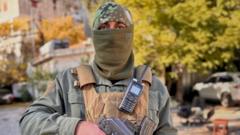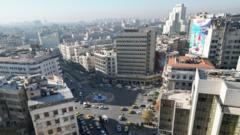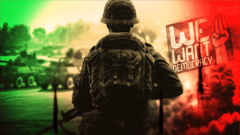In Latakia, the Alawite minority is navigating a volatile landscape as the rebel group HTS establishes itself as the new authority. Residents express profound fear over potential repercussions for past allegiances to the Assad regime and face alarming incidents of violence and property seizures.
Alawites Face Uncertainty Amid Shifting Power Dynamics in Latakia

Alawites Face Uncertainty Amid Shifting Power Dynamics in Latakia
As Hayat Tahrir al-Sham (HTS) takes control in Latakia, the Alawite community grapples with fear and insecurity following the fall of the Assad regime.
In the heartland of Syria's Alawite community, fear looms as Hayat Tahrir al-Sham (HTS) asserts its dominance in Latakia, a city that has historically been a bastion for the Assad regime. Noor, an Alawite woman, recounts a traumatic experience when armed men invaded her home, an incident emblematic of the growing unrest. Noor's pleas for justice were met at an HTS advisory center, where the stark shift from regime authority to rebel governance becomes glaringly evident.
Alawites, constituting around 10% of the Syrian populace, have long held a complex relationship with power due to their historical ties with the Assad family, which has ruled with an iron fist. Yet, in the wake of the regime's collapse, Sunni-dominated HTS, previously aligned with al-Qaeda, claims to embrace a vision of inclusivity and respect for all sects. Following this regime change, apprehension permeates Alawite society, with many residents reluctant to step outside their homes.
The changeover has resulted in clashes, as other armed groups exploit the power vacuum. Noor's distress is compounded by the alarming actions of these factions, who have evicted families and committed acts of violence. An injured man joins the queue at the HTS facility, sharing his harrowing tale of theft and family intimidation. These anecdotes reveal a city now rife with disorder, where the former military stronghold has been reduced to a site of complaints and civil distress.
Abu Ayoub, a commander with HTS, acknowledges the chaos but insists his group aims to uphold order amidst the fray. Yet, the societal scars run deep; a legacy of fear and division hasn’t easily faded. During a recent rally, amidst celebrations for the fall of the Assad family, an undercurrent of anxiety persists among Alawites, worried of potential vengeance from the majority Sunni population.
Despite the organization's assurances of governance and stability, Noor's experience reflects a broader sentiment of distrust among the Alawites. With HTS marking its territory through both brute force and policy, the transition from regime loyalists to citizens in a liberated society presents an immense challenge for the community.
As HTS continues to navigate its role as an enforcer of law and protector, Alawites remain apprehensive about their future. Noor's sentiment encapsulates the tension of hope and despair: she longs for peace yet cannot envision a return to normalcy. The hope is present but shaky, as the community contemplates an uncertain path in a landscape altered by years of conflict and opportunism.





















